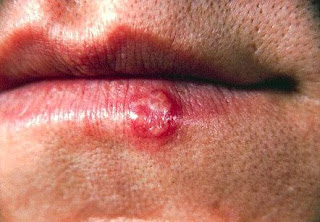 DEFINITION
DEFINITION Cold sores are fluid-filled sores caused by herpes simplex virus infection type 1. Different from cold sores to cancer. A person's body condition sometimes associated with the disease is cold sores. When you think the disease is not curable, you can take steps to reduce the frequency of appearance and to limit the duration of this happening.
SYMPTOMS
The symptoms of cold sores include:
- The emergence of small bumps, sore, and filled with fluid, making the skin red, especially around the mouth.
- Pain or tingling, called prodome, often preceded by skin blisters between one to two days.
- Usually occurs between 10-14 days.
Causes & Risk Factors
Cause
Herpes simplex virus that causes cold sores particular. Herpes simplex virus type 1 that causes cold sores. Herpes simplex virus type 2 usually causes genital herpes.
The first phase of what happens is you get herpes from someone who has a wound that has not healed. Sharing eating utensils, towels or razors, kissing and such can spread the herpes simplex virus type 1. Then contact the mouth - can cause genital herpes simplex virus infection type 1 on the genitals.
Once you hit the first stages of herpes infection before, the virus will be asleep for a while in the nerve cells of your skin and may emerge again as the infection at or near the affected body part in the first stage of infection. You will feel itchy or high sensitivity in the affected part of the previous infection. Fever, menstruation, stress, fatigue and exposure to direct sunlight can trigger a recurrence of this disease.
Cold sores and canker sores
Quite different from cold sores with canker in the afternoon, the conditions in which some people associate with cold sores disease. Cold sores caused by herpes simplex virus active again, and contagious. Canker afternoon is not contagious, canker sores afternoon is occurring in the soft tissues in the mouth, places where cold sores do not typically happen.
Prevention
You can take steps to shield themselves from the cold evening. To prevent the disease spreading to other body parts or to avoid infectious to others, such as:
- Avoid kissing and skin contact with others when seen any blisters. The virus can spread easily along the existing discharge from blisters.
- Avoid borrowing equipment. Supplies, towels, lipbalm and other equipment can spread the virus when blisters are formed.
- Keep your hands to keep them clean. Wash your hands properly before touching other people if you get cold sores.
- Be careful when touching other parts of your body. Area around the eyes and genitals can be a special area vulnerable to the spread of the virus.
- Use a sunblock. Use a sunblock on the lips and face before exposure to the sun for a long time to help prevent cold sores.